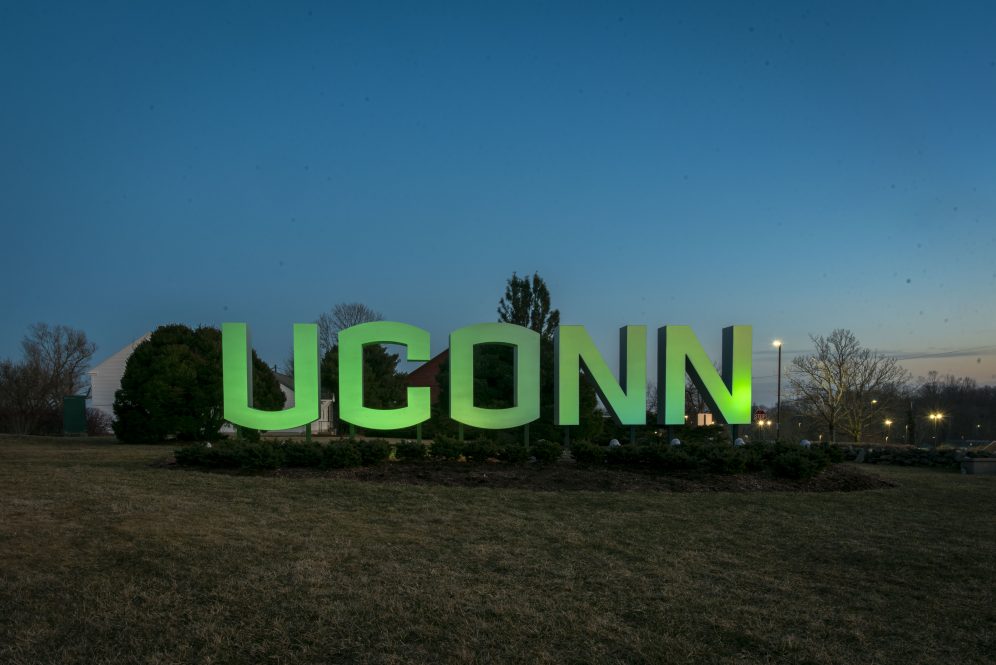UConn is receiving kudos for environmental stewardship on its campuses, garnering several awards from the State of Connecticut for projects that further its goal of achieving climate neutrality by 2030 and net carbon zero by 2040.
Several UConn employees also were honored as “Eco Champions” at the recent Connecticut GreenerGov Awards, which celebrate state agencies’ work to reduce their environmental impact and advance Connecticut’s climate and sustainability goals.
UConn received awards for expanding access to electric vehicle charging stations, reducing the use of volatile anesthesia gases at UConn Health, and incentivizing residential students to reduce their carbon footprint through the annual EcoMadness competition.
The University also received honorable mentions for initiating an on-demand hot water project at UConn Health that is expected to save 25,000 CCF (centrum cubic feet) of natural gas each year; and for achieving a 3% reduction in MMBtu (million metric British thermal units) in energy use from FY 2023 to FY 2024.
President Radenka Maric and others were on hand to receive the awards at the State Capitol ceremony hosted by the Connecticut Department of Energy and Environmental Protection (DEEP), the Office of Police and Management (OPM), and the Department of Administrative Services (DAS).
The GreenerGov initiative builds on directives outlined in 2019 in Gov. Ned Lamont’s Executive Order No. 1, which called on state agencies to expand the state’s Lead by Example program to reduce energy use, water, waste, and greenhouse gas emissions while lowering operating costs in state government facilities and operations.
The awards reflected state agencies’ achievements in FY24, which covered July 1, 2023, through June 30, 2024.
UConn’s honors included:
Sustainability Achievement Award: With 58 electric vehicle charging stations available for use, UConn was honored for installing and operating more than any other state agency. The stations are part of a strategy to support clean energy as part of UConn’s push for carbon neutrality by 2030.
Trailblazer Award: UConn Health was honored for its work to significantly reduce the use of volatile anesthesia gases such as nitrous oxide and desflurane, which are extremely harmful greenhouse gases with a global warming potential far exceeding carbon dioxide.
The coordinators of that effort also received honorable mentions in the Eco Champion Awards category: Dr. Adam Fischler, UConn Health’s operating room medical director and a faculty member in Department of Anesthesiology in the School of Medicine; and Karen Curley, UConn Health’s nursing director of procedural services.
Eco Champion Award: Seven UConn employees were honored for making significant efforts to implement behavioral changes to help save energy, water, and/or waste by coordinating the yearly EcoMadness competition.
The honorees were Katie Milardo, associate director of energy and water compliance; Stan Nolan, associate vice president for facilities operations; Patrick McKee, director of the UConn Office of Sustainability; Mark Bolduc, facilities operations manager of energy and compliance; Brian McKeon, facilities operations electrical engineer; Anna Parker, sustainability outreach intern coordinator for the UConn Office of Sustainability; and Betsy Mortensen, Office of Sustainability communications, outreach, and education coordinator.
The team coordinated last year’s EcoMadness competition among 27 campus residence halls at Storrs, where students competed to reduce energy and water, and to maximize recycling.
Throughout October each year, students work to lower their consumption from a baseline established in September. The Office of Sustainability coordinates the effort by recruiting and training EcoCaptains to lead their halls, where they educate residents on reducing energy and water usage and conduct weekly recycling audits to assess compliance with program criteria.
Winning halls receive coupons for free Dairy Bar ice cream. Last year’s winners in reducing energy consumption were the residents of Grange/Hicks residence hall in East Campus, which reduced its electric use by 30.76%.
In the water conservation category, the Allen/Kingston residence hall in the Towers Quadrangle led the pack with a 29.29% reduction; and in recycling, McConaughy Hall in North Campus achieved 92.5% compliance.



